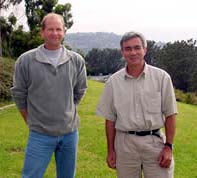Search Results for: ocean
Sinking boats raise automatic alarm up to space
At best, a yachtsman far out to sea experiences an exhilarating solitude to equal any space traveller. But too much isolation at sea can give rise to loneliness, disorientation and multiple dangers.
A new ESA-developed technology enables boat crews to check their positions, stay in constant contact with shore, receive urgent emergency warnings, and enable friends and family to remotely track them on the internet.
If a boat becomes dangerously water-logged or its power system is o

Large-scale climate change linked to simultaneous population fluctuations in arctic mammals
Scientists have shown, for the first time, that changes in a large-scale climate system can synchronize population fluctuations in multiple mammal species across a continent-scale region. The study, to be published in the 14 November 2002 issue of the journal Nature, compares long-term data on the climate system known as the North Atlantic Oscillation with long-term data from Greenland on the population dynamics of caribou and muskoxen, which are large mammals adapted to breeding in the Arctic.

Envisat’s MERIS captures phytoplankton bloom
From 800 km in space, you would have to squint really hard to see one of these – a micron-sized phytoplankton and its armoured shell. But when a lot of them get together, say, a few trillion or so…
…what you see is the image below from the European Space Agency’s Medium Resolution Imaging Spectrometer (MERIS) instrument. The sensor, carried onboard the Envisat satellite, acquired imagery of a phytoplankton bloom that occurred this summer in the north Atlantic, off the coasts of Nova Scotia
Pacific Ocean temperature changes point to natural climate variability
Analysis of long-term changes in Pacific Ocean temperatures may provide additional data with which to evaluate global warming hypotheses.
“Abrupt changes in water temperatures occurring over intervals of up to 25 years suggest that global warming may result as much from natural cyclical climate variations as from human activity,” said Benjamin Giese, oceanography professor in the College of Geosciences.
“Climate models constructed here at Texas A&M University were used to a

Scripps Research Gives Tiny Phytoplankton a Large Role in Earth’s Climate System
Study, which shows microscopic plants keep planet warm, offers new considerations for iron fertilization efforts in the oceans
The ecological importance of phytoplankton, microscopic plants that free-float through the world’s oceans, is well known. Among their key roles, the one-celled organisms are the major source of sustenance for animal life in the seas.
Now, in a new study conducted by researchers at Scripps Institution of Oceanography at the University of California,
New method strikes an improvement in lightning predictions
A new lightning index that uses measurements of water vapor in the atmosphere from Global Positioning Systems has improved lead-time for predicting the first lightning strikes from thunderstorms. The index will help greatly aid NASA Space Shuttle launches at Kennedy Space Center, Fla, and other commercial and U.S. Department of Defense launches from Cape Canaveral Air Force Station, Fla.
“Better forecasting and more advance warning of lightning strikes will help reduce the delays or cancell